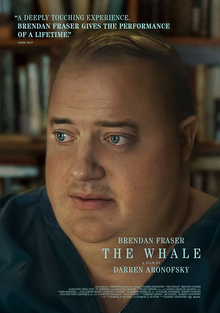
Obesity has always been a touchy subject for Hollywood. From misrepresentation to outright mockery, directors and actors alike have proven their inability to portray people with obesity with the respect they deserve.
Darren Aronofsky’s “The Whale” looks to break the stereotype that Hollywood has perpetuated, by telling the story of a person with obesity.
“The Whale” follows the final days of a reclusive English teacher named Charlie, played by Brendan Fraser. As he reflects upon his life and grieving his partner, he looks to reconnect with his estranged daughter (Sadie Sink). Despite medical advice from his nurse friend Liz (Hong Chau), he refuses to go to a hospital, opting instead to live out his few remaining days at home where a missionary (Ty Simpkins) begins forming a tentative friendship with Charlie.
“The Whale” explores themes of religious trauma, the effect of grief and eating disorders through the eyes of Charlie on his deathbed.
Admittedly, not all audiences are able to directly relate to Charlie’s eating disorder. People with obesity who have seen the movie appreciate Fraser’s respectful depiction and find comfort in him drawing from his own experiences to make Charlie’s story more authentic.
A psychologist specializing in obesity care advised A24 producers to reach out to the Obesity Action Coalition. The OAC is a non-profit organization dedicated to providing advocacy, preventative research and awareness on obesity. The group was happy to work with Aronofsky and Fraser to provide important insight on obesity, and help them create a piece of art that didn’t ridicule or disrespect those who have obesity.
The coalition also worked with the team to inform them of media bias and incorrect portrayals of obesity in the media. Their goal was to help promote Charlie’s story and ensure Fraser’s portrayal remained respectful and truthful. “OAC has continued to engage with A24, briefing them on weight bias and advising on media around the movie to ensure that all messages, images and language used are respectful and not stigmatizing,” they stated.
It’s important to note that the coalition had no say in the use of prosthetics nor Fraser’s casting. However, they feel he was able to relate to the character and used his own experiences to fully portray Charlie as a multidimensional character who wasn’t defined by his appearances.
Fraser’s own life has not been easy, especially after 2014 when Fraser was allegedly sexually assaulted by Hollywood Foreign Press Association president Philip Berk and battling the loss of his mother at the same time. Fraser took a break from acting, taking time to focus on his family and mental health after a physically and mentally draining career up until that point.
It’s clear that Fraser is very connected to Charlie, having gone through his own traumatic experiences and facing grief and loss that seemed to consume him from the inside out. Charlie’s own character experiences immense grief, a connecting point that many audience members related to on an intimate level.
Trauma and coping are essential components to the human experience, and Aronofsky clearly strives to highlight these topics which are often considered taboo.
Senior Gretchen Highberger sees the movie as an anchoring point for people to unite and recognize their own grief, seeing that all people can relate to Charlie on some level. “I think that everyone has their own way of coping with things, and that people will always find a way to deal with their own trauma. That part of the human experience is universal, trying to find somewhere to bury your hurt and finding a way to deal with your trauma,” she said. Fraser’s portrayal does a phenomenal job of linking Charlie’s trauma to his coping mechanisms, even if he doesn’t have the exact same experiences or ways of coping as the character.
The aim of the film was to show the redemption of a man who had gone through immense loss and to provide connection through a man grieving. However, there is still much debate on the quality and general success of the movie as a whole.
Reception of the film was extremely polarized, with some believing it to be Aronofsky’s greatest work—even up for Best Picture at this year’s Oscars—and others seeing it as a sorry attempt at summarizing the human experience.
Resident movie-goer and theater fanatic Charles Budan sees the latter, believing the adaption to be a sorry attempt from Aronofsky, too heavily reliant on the actor’s portrayal of the character’s through scrappy dialogue. “As an [adaptation], ‘The Whale’ does not have much to say and neither the story nor Aronofsky’s direction are captivating enough to stand on their own,” he remarked.
Many are able to relate to his statements. Much of the characters dialogue seemed too scripted, taking away from the story that Aronofsky was trying to convey. With a story as heavy as this, natural dialogue that allows the audience to immerse themselves is a must, and Aronofsky simply wasn’t able to hit that level of realism. His characters and the actors’ portrayal were deep and relatable, but shortcutted by the “scrappy dialogue.”
The one universal consensus surrounding the reception of the film is Chau and Fraser’s masterful portrayal of the characters. Despite the shoddy script, both actors were able to create a genuine connection to the audience, invoking a ruthless sense of abjection and compelling them to examine their own trauma and connect with the experiences of the characters. “The greatest redeeming factor [of the film] are the career defining performances of Chau and Fraser, who make the most of the doomed script they have been given,” Budan continued.
Fraser won Best Actor and Chau was nominated for Best Supporting Actress at the 2023 Oscars. While the vast majority of film-goers agree that “The Whale” would not have won Best Picture, there was some tension with the reveal that Chau did not win best supporting actress, further proving that the characters are what made this film so memorable.
Reception on Daron Aronofsky’s “The Whale” was mixed for a multitude of reasons, including but not limited to, Fraser’s portrayal of obesity through titular character Charlie and the questionable at best dialogue that the actors were given. Despite these roadblocks, the cast was able to create a piece of work that unites people on a profound level, leaving audiences in tears. It’s clear that this movie won’t leave the film scene quietly, and will remain a classic for years to come.








